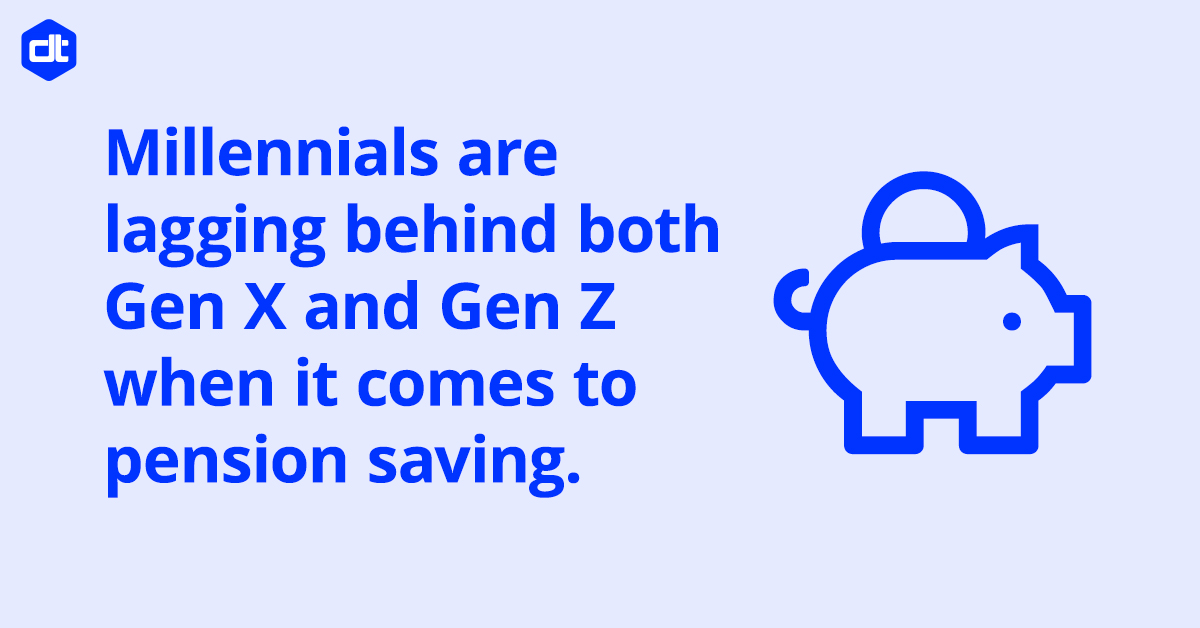What makes millennials vulnerable when it comes to pensions saving and how can the pensions dashboards help?
08 Sep 2025
 First seen in Professional Adviser
First seen in Professional Adviser
A problem is brewing in the world of pensions. 59% of Millennials (born between 1981 and 1996) are struggling to save for retirement, and only 20% say that paying into their pension is a priority, according to research by Phoenix Group.
The research suggests Millennials are the problem generation, lagging behind both Gen X (39% of whom are struggling to save into their pension) and Gen Z (48%).
So, what makes millennials uniquely vulnerable when it comes to saving for retirement?
Why is it hard for Millennials to save for their pension?
 Millennials, like other generations, lack understanding and knowledge about pensions. For many, pensions are opaque and intimidating, riddled with jargon and apparently detached from everyday financial life. This seemingly insurmountable complexity leads to disengagement. In addition to this, they were the first generation to benefit from automatic enrollment, which has proven to be a double-edged sword. Looping them into the pensions saving system has created apathy among some; many are saving for retirement, but few are saving enough.
Millennials, like other generations, lack understanding and knowledge about pensions. For many, pensions are opaque and intimidating, riddled with jargon and apparently detached from everyday financial life. This seemingly insurmountable complexity leads to disengagement. In addition to this, they were the first generation to benefit from automatic enrollment, which has proven to be a double-edged sword. Looping them into the pensions saving system has created apathy among some; many are saving for retirement, but few are saving enough.
Millennials have also had a tricky financial backdrop to contend with. Soaring house prices, high student debt, insecure work, burdensome childcare costs and wage stagnation have each contributed to a feeling of fiscal insecurity among this generation. It can feel easier to reduce pension savings to boost today's finances, leaving tomorrow to fend for itself (this is known as present bias).
Elsewhere, upcoming changes to inheritance tax rules will see pensions counted as part of the assets subject to tax from 2027. This represents a major blow to millennials, who typically rely on inheritance to bolster their net worth. It is therefore more vital than ever that millennials develop a more engaged relationship with their retirement savings.
More on Pensions Dashboards
Pensions Dashboards represent a chance to stimulate engagement
 The long-awaited pension dashboards offer an opportunity to spark interest and awareness. Discovering a forgotten pension pot will be a fun and unexpected surprise for some, like finding a £5 note in an old coat pocket. Seeing their money in one place could shift apathy into action, prompting millennials to feel empowered to save for retirement.
The long-awaited pension dashboards offer an opportunity to spark interest and awareness. Discovering a forgotten pension pot will be a fun and unexpected surprise for some, like finding a £5 note in an old coat pocket. Seeing their money in one place could shift apathy into action, prompting millennials to feel empowered to save for retirement.
Yet awareness alone isn't enough. The industry cannot presume that dashboards will be enough to shift behaviour, it will be years before we can welcome commercial dashboards and there is still little information on what post-view services will look like. If users are confronted with incomprehensible figures, data projections and financial jargon, apathy will swiftly return. To be genuinely transformative, pension dashboards must become more than passive information hubs, they must be active learning environments.
This is where technology comes to the fore. To move users from mere awareness to meaningful engagement, dashboards must incorporate streamlined, self-service modelling tools. Interactive widgets embedded within the dashboard experience should allow users to model "what if" retirement scenarios that allow them to see the effects of increasing contributions or even visualise the cost of fees and tax on real outcomes.
Critical to success will be how dashboards evolve from their humble initial designs. For dashboards to offer the step change in consumer engagement, these modelling tools must speak in plain, accessible language, use intuitive visuals, and present information in relevant and personalised context. Millennials, a generation of digital natives, will expect a dashboard experience that is as seamless as their best banking or shopping app and as simple to digest as their favourite artificial intelligence agent.
Regulation can aid Millennial pension engagement
Regulation has a significant role to play when it comes to getting Millennials to engage with their pensions. The Financial Conduct Authority's recent targeted support and guided retirement proposition will, if formally established, enable firms to provide suggestions designed for groups of consumers with common characteristics.
This has the potential to make pensions relatable, to encourage thinking beyond present bias. The two most common questions that come up are how much do I need and how am I doing compared to others/my plan? Let's bring this information to the masses to reduce complexity around retirement and act a bridge to more formal financial advice, should they feel they need it.
Millennial pension apathy is a symptom of a combination of complexity and inertia within the system, as well as a challenging financial backdrop. By joining forces, the regulator, providers and tech specialists can turn the dashboard rollout into an inflection point, building a new culture of proactive, confident saving for retirement.
Success will be measured not by dashboard logins, but by action, understanding, and the number of people who can look forward to retirement with clarity i.e. they are engaged with and not in fear of their pension.
Paul Muir
Co-Managing Director at Dunstan Thomas
023 9282 2254
enquiries@dthomas.co.uk